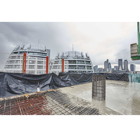Rehau has TABS on landmark London office

The already-iconic White Collar Factory in London’s Old Street is now open for business – but key to the contemporary work spaces is the creation of a comfortable working environment. That is why more than 150km of Rehau’s Thermally Activated Building Structure (TABS) system was installed to provide low energy passive cooling – almost enough piping to run entirely round the M25.
This makes the installation one of the largest of Rehau’s TABS solution so far in Europe, and it has been completed by specialist installers Anders Heating Company.
Rehau TABS was specified by consultants ARUP as part of a programme to deliver a flexible, practical building which can achieve 25% reductions in operational carbon emissions over a typical office building and both a BREEAM Excellent and LEED Platinum rating.
Developed by Derwent London the former factory is designed around the principles of reducing artificial heating, cooling and lighting, the White Collar Factory deliberately echoes many of the adaptable, well built industrial buildings of the past which have been converted so successfully into contemporary work spaces. Alongside the thermal mass structure, it features tall ceilings, a passive façade and flexible floor plates.
In TABS, Rehau’s PE-Xa polymer pipework is embedded within the concrete floor slabs. Chilled water is circulated through the pipework and this enables the slab to act as a heat sink; drawing the heat away from the useable space and creating a comfortable working environment for the occupants.







